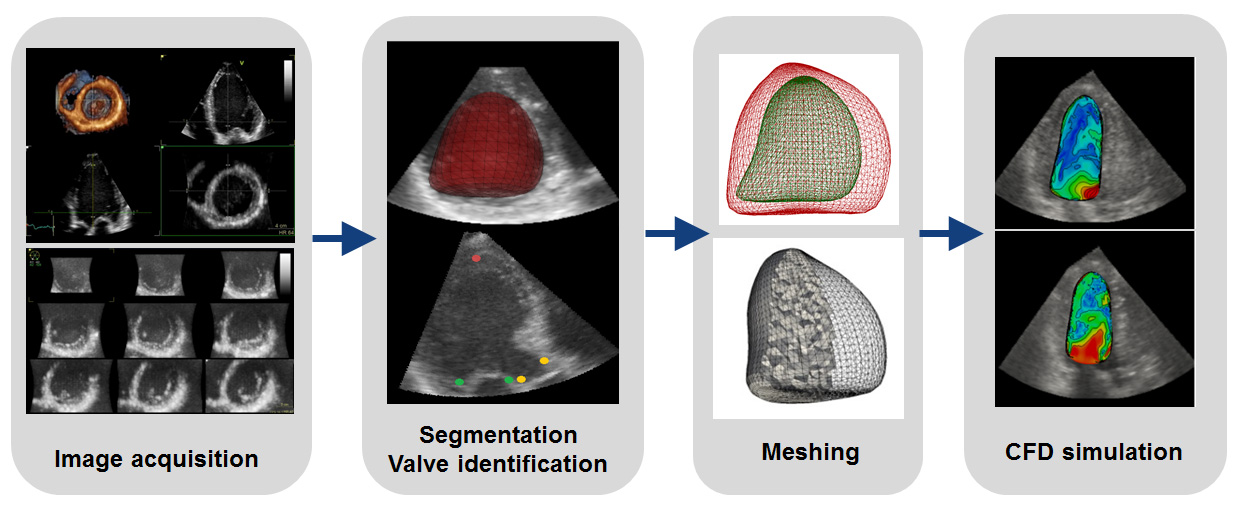Patient-specific left ventricular flow simulations from transthoracic echocardiography

Description (background and methods)
The combination of medical imaging with CFD has enabled the study of 3D blood flow on a patient-specific level. However, with models based on gated high-resolution data (such as CT or MRI), the study of transient flows, and any model implementation into routine cardiac care may be challenging. In this project we use routine 4D TTE as only input modality to perform patient-specific CFD simulation of left ventricular blood flow.
From 4D TTE images, the endocardial border of the left ventricle is segmented, and the aortic and mitral valves, representing the model in- and outflow tract, are manually identified. From the initial surface mesh a finer mesh is obtained by subdividing elements, creating a surface mesh of in average 41 000±1000 nodes. An ALE formulation of the incompressible Navier-Stokes equations is then used to describe the intraventricular blood flow, and to account for the temporal movement of the endocardial wall.
In our first study the robustness of the simulation pathway was evaluated, by generating repeated models with alternating input variables for six subjects. The simulated flows were also validated against ultrasound Doppler (100 subjects) and 2-D through-plane phase-contrast MRI measurements in 6 subjects.
On-going model developments include e.g. to implement more anatomically accurate heart valve models into the pathway, which may further enhance the clinical value of the simulations.
(Preliminary) results and publications
The robustness evaluation of the pathway indicated a model deviation of <12%, with highest regional and temporal deviations close to the apical segments and at peak systole, respectively. The validation against MRI and ultrasound Doppler showed an error of <11% (velocities <10 cm/s), with no significant regional or temporal differences observed.
More information about the project can be found in the following publications:
Peer-reviewed publications
- Larsson D, Spuhler JH, Petersson S, Nordenfur T, Colarieti-Tosti M, Hoffman J, Winter R, Larsson M, Patient-Specific Left Ventricular Flow Simulations From Transthoracic Echocardiography: Robustness Evaluation and Validation Against Ultrasound Doppler and Magnetic Resonance Imaging. IEEE Trans Med Imaging. 2017 Nov; 36(11):2261-2275.
Conference proceedings
- Larsson D, Spühler JH, Weinkauf T, Colarieti-Tosti M, Winter R, Larsson M, Hoffman J, Influence of valve position and inflow direction on intraventricular flow: uncertainty quantification of patient-specific cardiac flow simulations. 5th Int Conf Comp Math Biomedical Eng (CMBE) 2017, Pittsburgh, PA, USA.
- Larsson D, Spühler JH, Günyeli E, Weinkauf T, Hoffman J, Colarieti-Tosti M, Winter R, Larsson M, Estimation of left ventricular blood flow parameters – clinical application of patient-specific CFD simulations from 4D stress echocardiography, SPIE Medical Imaging 2017, Orlando, FL, USA.
- Larsson D, Spühler JH, Petersson S, Nordenfur T, Hoffman J, Colarieti-Tosti M, Winter R, Larsson M, Multimodal validation of patient-specific intraventricular flow simulations from 4D echocardiography, IEEE International Ultrasonics Symposium 2016, Tours, France.
- Larsson D, Spühler J H, Nordenfur T, Hoffman J, Colarieti-Tosti M, Gao H, Larsson M. Patient-specific flow simulation of the left ventricle from 4D echocardiography - feasibility and robustness evaluation. IEEE International Ultrasonics Symposium 2015; Taipei, Taiwan.
Collaborations
- Karolinska Institutet, Stockholm, Sweden, Reidar Winter, Department of Clinical Sciences
- CNRS - Centre national de la recherche scientifique, Paris, France, Didier Lucor, Laboratoire d'Informatique pour la Mécanique et les Sciences de l'Ingénieur
